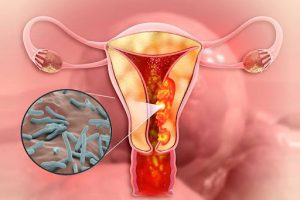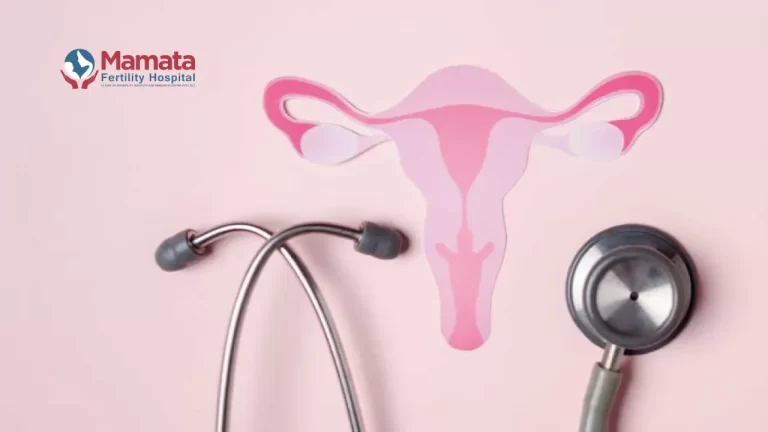Endometrial TB
At Mamata Fertility Hospital in Secunderabad, we are dedicated to providing compassionate care for women facing health challenges.
One lesser-known yet significant condition affecting women’s reproductive health is Endometrial Tuberculosis (TB). This form of tuberculosis can have serious effects on a woman’s uterus and, in some cases, her fertility.
This guide will help you understand what Endometrial TB is, its causes, symptoms, and how it can be treated to support women’s health effectively.
For Appointments, Please Call:
More On Endometrial TB
What is Endometrial TB?
Endometrial TB is a form of tuberculosis that affects the endometrium, which is the inner lining of the uterus. It is a part of a broader condition called genital tuberculosis, which can affect various parts of the female reproductive system, such as the fallopian tubes, ovaries, and cervix.
Tuberculosis is caused by a bacteria called Mycobacterium tuberculosis. While it commonly affects the lungs, it can spread to other parts of the body, including the reproductive organs, through the bloodstream or lymphatic system. When this bacteria infects the endometrium, it leads to inflammation and damage, which may cause complications, including infertility.
Early detection and treatment of Endometrial TB are crucial to prevent serious health and fertility issues.

Causes and Risk Factors
Endometrial TB occurs when the bacteria responsible for tuberculosis spreads to the uterus. Several factors can increase a woman’s risk of developing the condition.
Causes of Endometrial TB
-
- Primary TB Infection: Tuberculosis in the lungs or other parts of the body may spread to the reproductive organs if left untreated.
- Latent TB Activation: Even dormant bacteria in the body can become active later, especially when the immune system is weakened.
- Untreated Genital TB: Infection in nearby reproductive organs, such as the fallopian tubes, can spread to the uterus.
Risk Factors
-
- Poor Immunity: Conditions like HIV, malnutrition, or long-term illnesses can make the body more vulnerable to TB bacteria.
- Exposure to TB Patients: Close contact with someone who has active tuberculosis increases the risk of contracting the disease.
- Previous Untreated TB: Women who have had tuberculosis in the past may be at a higher risk of the infection spreading to the endometrium.
- Socioeconomic Factors: Lack of access to healthcare and poor living conditions may increase risk due to delayed diagnosis and treatment of primary tuberculosis.
Being aware of these risk factors helps in early detection and effective management.
Symptoms and Diagnosis
Symptoms of Endometrial TB are often subtle and might overlap with other reproductive issues, making diagnosis challenging. However, prompt medical evaluation is essential when symptoms arise.
Common Symptoms
-
- Irregular Periods: Menstrual cycles may become unpredictable, with lighter or heavier bleeding than usual.
- Pelvic Pain: Persistent discomfort in the lower abdomen is a common warning sign.
- Unexplained Infertility: Difficulty conceiving without another clear explanation may be linked to Endometrial TB.
- Unusual Vaginal Discharge: Foul-smelling or blood-tinged discharge could indicate an infection.
- Fatigue and Fever: Low-grade fever and fatigue are common in advanced cases.
If you experience any combination of these symptoms, it is essential to seek medical advice.
Diagnostic Approaches
At Mamata Fertility Hospital, we use advanced diagnostic methods to detect and confirm Endometrial TB. These include:
-
- Medical History and Physical Exam: Your doctor will discuss symptoms and examine clinical signs of infection.
- Ultrasound: Imaging tests may show irregularities in the reproductive organs.
- Hysteroscopy: This minimally invasive procedure allows doctors to view the inner lining of the uterus and collect tissue samples.
- Endometrial Biopsy: A sample of the uterine lining is tested for the presence of tuberculosis bacteria.
- Polymerase Chain Reaction (PCR) Test: PCR can detect tuberculosis bacteria with high sensitivity, often used to confirm the diagnosis quickly.
- Blood and Skin Tests: Other tests, like the Mantoux skin test or Interferon-Gamma Release Assays (IGRAs), may be used to identify TB infection elsewhere in the body.
Prompt diagnosis ensures that treatment for Endometrial TB can begin before serious complications develop.
Impact on Fertility
Endometrial TB can significantly impact a woman’s ability to conceive. The infection damages the uterus and other reproductive organs, which may lead to infertility or pregnancy complications.

Effects on Fertility
-
- Scarred Uterine Lining: Chronic inflammation can cause scarring or thinning of the endometrium, making it difficult for an embryo to implant.
- Blocked Fallopian Tubes: TB infection often spreads to the fallopian tubes, causing blockages that prevent eggs from meeting sperm.
- Hormonal Imbalances: Damage to reproductive tissues may disrupt hormone levels, leading to cycle irregularities.
Pregnancy Challenges
Even if conception occurs, women with untreated Endometrial TB may experience a higher risk of:
-
- Ectopic pregnancy (implantation outside the uterus)
- Pregnancy loss or recurrent miscarriages
Working with a fertility specialist is the best way to assess and address these challenges.
Treatment and Management Options
The good news is that Endometrial TB is treatable with early intervention. At Mamata Fertility Hospital, we offer standardized and customized treatments tailored to each patient’s needs.
Medical Treatment
-
- Anti-Tuberculosis Therapy (ATT): A long-term antibiotic regimen designed to eliminate TB bacteria. Typically taken for 6–9 months, consistency in medication is critical for full recovery.
- Hormonal Support: For women struggling with infertility, hormone therapy can help regulate menstrual cycles during recovery.
- Fertility Treatments: Procedures like in-vitro fertilization (IVF) may be recommended for women facing infertility due to permanent tissue scarring after TB.
Surgical Options
Rarely, surgery may be needed if complications like abscesses or severe scarring in reproductive tissues occur. Minimally invasive procedures can improve outcomes without major disruptions to the reproductive system.
Sticking to the prescribed treatment plan is critical to a full recovery.
Lifestyle and Dietary Recommendations
Supporting your overall health can help your body fight and recover from Endometrial TB. Here are some lifestyle tips:
Nutrition
-
- Protein-Rich Foods: Eggs, lentils, and poultry aid in tissue repair and immune function.
- Antioxidants: Fresh fruits and vegetables (like oranges and spinach) combat inflammation.
- Iron Intake: Iron-rich foods like leafy greens and fortified cereals prevent anemia, a common issue for women with TB.
Healthy Habits
-
- Stay Active: Gentle exercise like yoga or walking boosts circulation and energy levels.
- Avoid Alcohol and Smoking: These habits weaken the immune system and slow recovery.
- Get Vaccinated: If exposed to TB, consider the BCG vaccine to reduce the risk of infection.
Building a healthy lifestyle complements medical treatment and improves recovery outcomes.
Frequently Asked Questions (FAQs)
1. Is Endometrial TB contagious?
No. While TB in the lungs is contagious through droplets, Endometrial TB is not spread through close contact.
2. Can Endometrial TB be completely cured?
Yes. With a full course of ATT, most women recover fully and can go on to lead healthy lives.
3. Can I conceive after Endometrial TB treatment?
Many women regain fertility after successful treatment. However, if complications like scarring remain, assisted reproductive techniques like IVF can help.
4. Is diagnostic testing for Endometrial TB painful?
While tests like biopsies may cause mild discomfort, they are generally quick and well-tolerated.
5. How soon will I feel better after starting treatment?
Symptom relief typically begins within a few weeks, but completing the full course of antibiotics is vital to prevent recurrence and complications.
At Mamata Fertility Hospital, we specialize in diagnosing and managing Endometrial TB with expertise and care. If you’re concerned about your menstrual health or fertility, reach out to our team. Together, we’ll create a treatment plan that supports your health and future aspirations. Contact us today to start your care plan!
Reviewd By

Dr Aarti Deenadayal Tolani
Clinical Director, Scientific In-Charge & Fertility Consultant
MBBS, MS ( OBGYN), FICOG
Expert in Reproductive Endocrinology, Infertility, Advanced Gynaec Ultrasound, and Faculty at Mamata Fertility Hospital.
Blogs and Articles

Common Myths and Facts About PCOS
Clear up common myths and facts about PCOS with expert insights from Mamata Fertility Hospital. Learn facts and effective management tips.

PCOS, Periods, and Diabetes: What Is Their Deep Connection?
PCOS, periods, and diabetes are all linked through insulin. Learn how to manage them and protect your health long-term.

Why Is PCOS Often Misdiagnosed?
PCOS often gets misdiagnosed due to overlapping symptoms. Learn why it’s tough to spot and how to get the right diagnosis.

